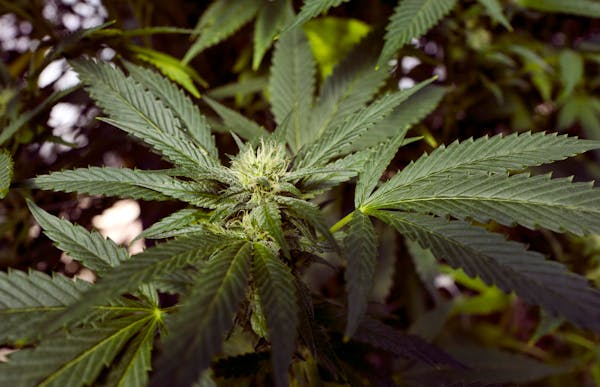WASHINGTON – Sen. Amy Klobuchar said Friday that she supports the legalization of marijuana, increasingly a mainstream position in the Democratic Party nationwide and in Minnesota.
"I support the legalization of marijuana and believe that states should have the right to determine the best approach to marijuana within their borders," Klobuchar said in a statement released by her presidential campaign. It was originally submitted to the Washington Post for an article about Democratic presidential candidates and their stance on legalization.
Most of the major Democratic candidates for president have come out in support of full legalization, including Sens. Kamala Harris, Cory Booker, Kirsten Gillibrand, Elizabeth Warren and Bernie Sanders.
"It certainly no longer makes you a leader on the issue in the Democratic Party, but it certainly does speak volumes about what marijuana as an issue has become in Democratic politics," said John Hudak, a senior fellow at the D.C.-based Brookings Institution who has studied marijuana legalization efforts nationwide. (Hudak disclosed that he has donated to Klobuchar's presidential campaign.) "You don't have to be a leader on the issue to be credible, but if you as a Democrat are actually opposed to legalization, that's going to significantly hurt you in the presidential primary."
Klobuchar's views had previously been somewhat of a mystery to legalization advocates, Hudak said. Several of the other Democratic contenders have been more upfront in the debate. Sanders introduced legislation in 2015 to end the federal government prohibition on marijuana. Both Booker and Warren have also introduced measures to legalize the drug at the federal level.
A November 2018 poll of 800 voters in 60 battleground congressional districts by Lake Research Partners and Fabrizio, Lee & Associates found that 60 percent of those polled support legalizing marijuana. That rose to 77 percent of Democrats and 73 percent of independents, while 34 percent of Republicans supported it.
President Donald Trump has previously said that he supports leaving decisions about marijuana legalization up to individual states. While the Justice Department under former Attorney General Jeff Sessions was seen as unfriendly to state-level legalization efforts, his successor, Attorney General William Barr, has said blocking state-level laws would not be a priority under his leadership.
To date, 10 states and the District of Columbia have legalized marijuana for recreational purposes. Those states are Alaska, California, Colorado, Maine, Massachusetts, Michigan, Nevada, Oregon, Vermont and Washington.
Recreational marijuana is still illegal in Minnesota, though the state does authorize medical marijuana for certain conditions. Democratic Gov. Tim Walz supports legalization, and state lawmakers have introduced legislation along those lines, although it faces uncertain prospects in the Republican-controlled state Senate.
Klobuchar served eight years as Hennepin County prosecutor, and prosecutions of marijuana-related crimes would have been a routine matter under her watch. Many Democratic voters have come to view legalization of marijuana as valuable not simply for recreational purposes but because such prosecutions nationwide have historically shown racial bias in who gets targeted.
"Especially for Democrats, there's a social and racial justice aspect to the issue that's increasingly going to make it very difficult for a Democrat to explain opposition to legalization," Hudak said.
Patrick Condon • 202-662-7452
Judge in Trump case orders media not to report where potential jurors work
Suspect in fire outside of US Sen. Bernie Sanders' Vermont office to remain detained, judge says
Biden administration moves to make conservation an equal to industry on US lands
Coalition to submit 900,000 signatures to put tough-on-crime initiative on California ballot

